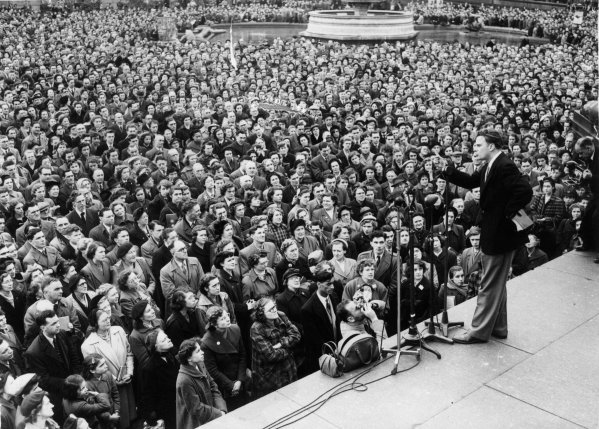In the religious world of my youth and adolescence, Billy Graham was a rock star. He was the publicly recognizable and telegenic face of the version of Christianity in which I was raised, an conservative evangelical faith in which the whole point of being a Christian was to evangelize, to get other people to be our sort of Christian, thus increasing the number of people ultimately going to heaven and reducing those headed for hell (a zero-sum game if there ever was one). Billy Graham’s “Crusades,” held in venues holding thousands all over the world, were often televised—they were must-see TV for everyone in my religious circle of reference. We rejoiced as hundreds flocked to the front of the venue during the altar call, racing to see who could be first to officially turn their lives over to Jesus.

I thought about Billy Graham for the first time in many years the other day when I stumbled across a brief reference to a 1960 meeting between Graham and Karl Barth, the highly influential Swiss Protestant theologian whom Pope Pius XII once declared to be “the greatest theologian since Thomas Aquinas.” Although I am a philosopher rather than a theologian, Barth’s monumental body of work has frequently intersected with classes I have taught over the past three decades, primarily because of his influence on Dietrich Bonhoeffer (my favorite theologian), his involvement with the Confessing Church in Germany during the Nazi period, and his authorship of the Barmen Declaration in which he sought to establish a line of resistance to the increasing influence of Nazi ideology on the German National church.
I had no idea that Billy Graham, the evangelistic rock star, and Karl Barth, one of the most important theologians ever, had met in person. As it turns out, Barth’s son Markus introduced his father and Graham while Billy was in Europe for a series of his crusades. Barth reportedly described Graham as “a jolly good fellow, with whom one can talk easily and openly . . . he is even capable of listening which is not always the case with such trumpeters of the gospel.” But Barth’s opinion of and attitude concerning Graham changed drastically when he went to one of Graham’s crusades two weeks later and observed the evangelist’s influence on the crowd. Barth said that
I was quite horrified. He acted like a madman and what he presented was certainly not the gospel. It was the gospel at gun-point . . . He preached the law, not a message to make one happy. He wanted to terrify people. Threats always make an impression. People would always much rather be frightened than joyful. The more one heats up hell for them, the more they come running . . . It was illegitimate to make the gospel law or ‘to “push” it like an article for sale . . . We must leave the good God freedom to do his own work.
I leave it to theologians, professional or amateur, to argue about the nuances of the differences Barth is describing between himself and Graham. What Barth’s words do for me is take me back to my youth, when as a child I was perpetually afraid that God was angry at me and that my feeble attempts to “get right with God” were undoubtedly not good enough.
From my earliest memories I learned about a God who reportedly loved everyone and wanted everyone to end up with him (always a “him,” of course) in heaven, but who was also willing to condemn those who didn’t respond to his love properly and convincingly to an eternity of hellfire and suffering. I learned a lot about original sin and God’s judgment. The remedy was to be “born again” as Jesus described to Nicodemus in John 3 or, as we more frequently put it, “being saved.” Our church was small, no more than a hundred at a well-attended service; new people almost never came to church. Still, virtually every service ended with an altar call, an opportunity for people to come forward, commit their lives to Christ, and become “saved.” No one ever came forward; apparently, the regulars were secure in their saved-ness.
But I wasn’t. I was sure that I was unacceptable to God on the face of it, and was unsure that I was “saved.” I had said the words before, but felt just as unacceptable afterwards as I had before. The church we attended was ten miles or so from home. Frequently, on the drive home, I sat in the back seat whispering heavenward the “sinner’s prayer” that people who wanted to be saved were supposed to say, just in case it hadn’t worked any of the dozens of time I’d said the prayer before.
Karl Barth’s horror at Billy Graham’s “gospel at gun-point” resonates with me, because I recognize the fear and terror that energize the “get saved or you’re going to hell” version of Christianity that Graham was preaching. I recognize both the terror and the attraction of the message—who wouldn’t want to “get right with God” when one’s eternal soul is at stake? It took me many years, decades even, to uproot the angry and judgmental God from my psyche. I no longer believe that God is looking for reasons to send people to hell; more importantly I don’t believe that God is angry at me—or at any of us.
A few days ago, a new Twitter acquaintance challenged people to “sum up the Bible in one sentence.” It took me less than a minute to respond
God used to be angry at me, but God isn’t angry at me anymore.
I’m not sure how well that works as a summary of the arc of Scripture; I expect a blog post reflecting on it will be forthcoming. But it does, in one sentence, summarize the arc of my own faith journey, from a person who sought both love and acceptance from an all-powerful deity whose strategy was to drive me through fear toward a conditional love, to a person who is continually astounded by the idea that the divine seeks relationship rooted in unconditional love with human beings, both collectively and (especially) individually, a relationship that, once chosen, I cannot destroy. The overall theme of this blog over the past seven-and-a-half years has been to track both the history and implications of this change. To steal a metaphor from Dr. King, the arc of faith is long, but it bends toward unconditional love.
“The Gospel at gun-point” is a striking description, but for one raised in the world of evangelical, conservative Christianity, it is not an overstatement. Karl Barth was right when he observed that fear is a great motivator. But we are told in First John that “perfect love casts out fear”—that’s the true energy of the gospel. I choose to adopt the working hypothesis that God is not angry at us, even though we might deserve it. God, instead, chooses to invite and welcome each us with love into relationship. And that opens up an infinity of possibilities.













